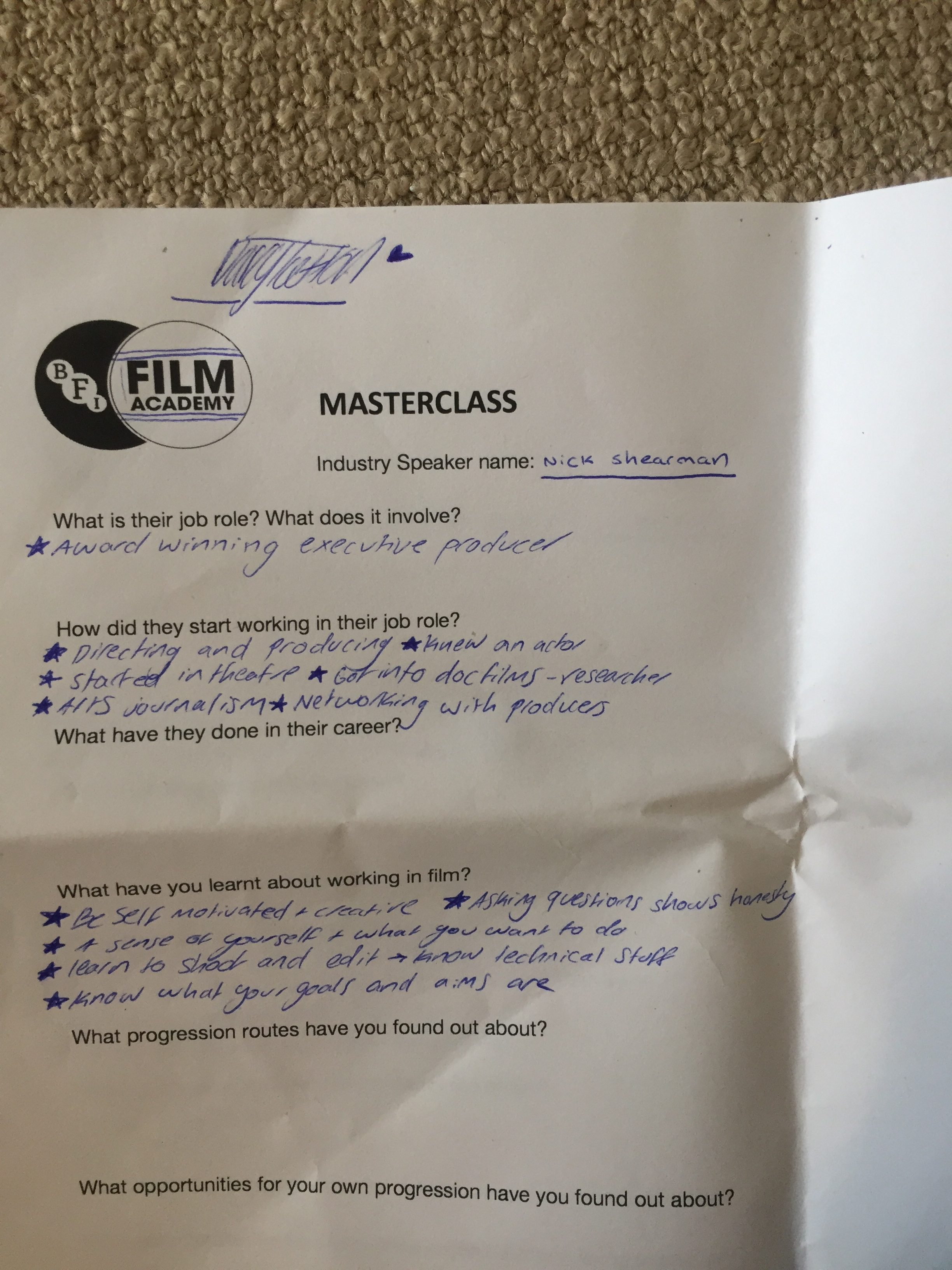2.1 Explain the working culture of the film industry
Working in the film industry is a creative and high pressure environment which relies on efficient group work and creative idea generation.
There are many skills needed when working in the film industry, it is important to be able to be self motivated and determined to make creative and original content, while also being time efficient and handling heavy loads of work. You need to be able to work under pressure and network with other professionals to help further your career, also it is important to be able to work well within a group setting.
I have learned that it is important to keep strong in your creative ideas and be able to communicate them through the team your working with while also positively supporting other’s own thoughts on your project.
2.2 Describe a range of key job roles and responsibilities in the film industry
 the PRODUCER is responsible for managing the production from start to finish. The producer develops the project an idea and makes sure the script is finished and arranges the financing and manages the production team that makes the film. The producer also coordinates the filmmaking process, for example creating the shoot schedule, organising timings to work with contributors, to ensure that everyone involved in the project is working on schedule and on budget. Without the producer, films do not get made.
the PRODUCER is responsible for managing the production from start to finish. The producer develops the project an idea and makes sure the script is finished and arranges the financing and manages the production team that makes the film. The producer also coordinates the filmmaking process, for example creating the shoot schedule, organising timings to work with contributors, to ensure that everyone involved in the project is working on schedule and on budget. Without the producer, films do not get made.
DIRECTOR
The director is responsible for overseeing the shooting and assembly of a film. The director has the vision of the film but they would not be able to make the film without the help of the rest of the crew. A director works at the center of film production, but they must agree each set up and shot with the camera and sound teams for example. In documentary production often one person does the job of director and producer.
CINEMATOGRAPHER
The director of photography is responsible for the camera team. On a feature film, this includes camera operators, camera assistants, grip crew and gaffers who deal with the lighting. In a documentary team its a much smaller crew – there is usually only a single camera operator who shoots all the footage for the film.
SOUND MIXER responsible for recording all sound on set during production using professional audio equipment, This requires choosing and using the microphones and recording media for the job, and mixing the audio in real time.
Usually, the recordist will arrive on location with his/her own kit, which normally includes microphones radio systems, booms, mixing desk, audio storage, cables, tools etc. The recordist may be asked to capture a wide variety of sound on location and must make sure that the audio is really clear especially for any dialogue/ interview.
2.3 Potential progression routes into the film industry and wider sector
GROUP F – RAVI, TOVE, MASON, DARCY, NATHALIE
CREATE
. Funding – Funding is important in creating a film with high production value, there are many ways to get this funding such as; BFI, Random acts, Kickstarter, Gofundme, BBC shorts, Hive, or simply saving up yourself.
.Distribution – Distribution is an effective way of getting your film more exposure, this can be done by entering into film festivals such as Encounters, BFI future or Ida, using social media or trying to get the film into organisations like Calling the shots, In between time and Without a box.
. Online content – Online content relates to distribution in how it is also a good way of giving your film exposure, platforms such as Youtube, Vimeo, social media or making a website all work well in publishing your film online.
. Collaboration – Collaboration includes meeting creative people and building relationships through various film experience, things like responding to ads, networking and joining courses/groups such as BFI and Rife are helpful in making connections.
WORK
There are many opportunities in the working media industry, one way is to work towards a role. Starting as a runner then going to camera assistant or lighting op and eventually going to director of cameras.
Many production companies also exist around Bristol, for example: BBC, Doghouse studios, bottle yard, Aardman etc.
Apprentices can be found at places such as itv, BBC and channel 4 as well as internships at somewhere like Rife Magazine.
NETWORKING
Networking is very important to further your opportunities in the film industry. Don’t be afraid to talk to others in the industry, about opportunities and showing your work to them.
Going to film festivals like Film Bath, Encounters, Bristol Radical Film Festival and Glasgow Film Festival can be a good place to network with filmmakers, Execs and those looking for films to fund, so this can be a great way to make contacts.
Cables & Cameras is a good crew and job website to find people to work on films/find jobs.
If you watch a film or TV show that you enjoy, you could email the executive producer and ask for a meeting to show your work, there’s no harm in trying!
Online networking
Facebook networking:
- ‘Bristol Film’ is a Facebook group which informs the members of casting calls and equipment hire. Being part of this group would give you opportunities to network with other members and find cast for projects
- ‘Creative Skills Hub West’ is a Facebook page which features course opportunities and experience, these opportunities would give you the opportunity to network with others also taking part.
- ‘BFI Alumni’ is a closed Facebook group for people who have done the bfi course, you can network with all the alumni and get connections through them.
- ‘FAB’ is a Facebook page with opportunities & work experience posted in it, through these opportunities you get network with those there with you.
- ‘BFI Film Academy’ has a Facebook page with events and course opportunities and funding opportunities, you can also network on this page and by taking up these opportunities.
Other online networking: Websites where you can network through opportunities and others on site.
- ’SYNCSW’ is a website with opportunities, film education and competitions by taking part in these you can meet others in the industry and build up connections.
- ‘BAFTA GURU’ has career advice for films and other opportunities.
- ‘Network.bfi.org’ events and residentials for industry professionals
Learn
Furthering your education and progress in the film industry can be done through a variety of different routes.
Film School or University
The UK has a variety of different opportunities for paid further education. There are a small amount of privately run film schools (MET Film School) and a larger amount of University courses focused on technical Film courses. Here is a list of some Universities that offer these courses.
- UWE Bristol
- Westminister
- Gloucestershire
- University of the Creative Arts
- Arts University Bournemouth
Apprenticeships
The mainstream alternative to film school are apprenticeships with larger broadcasting corporations. A number of British Film and Television organisations offer apprenticeships that lead to a job:
- BBC
- Channel 4
- ITV
Independent Content Creator
For any filmmakers who do want to take the independent track there is a large amount of free filmmaking content online that can inform your filmmaking
MY PROGRESSION ROUTES:
Learning from Masterclasses






Hi Darcy, your masterclass notes and group research show really good learning around progression routes into film – you have achieved this section to a high standard. Well done. Ses